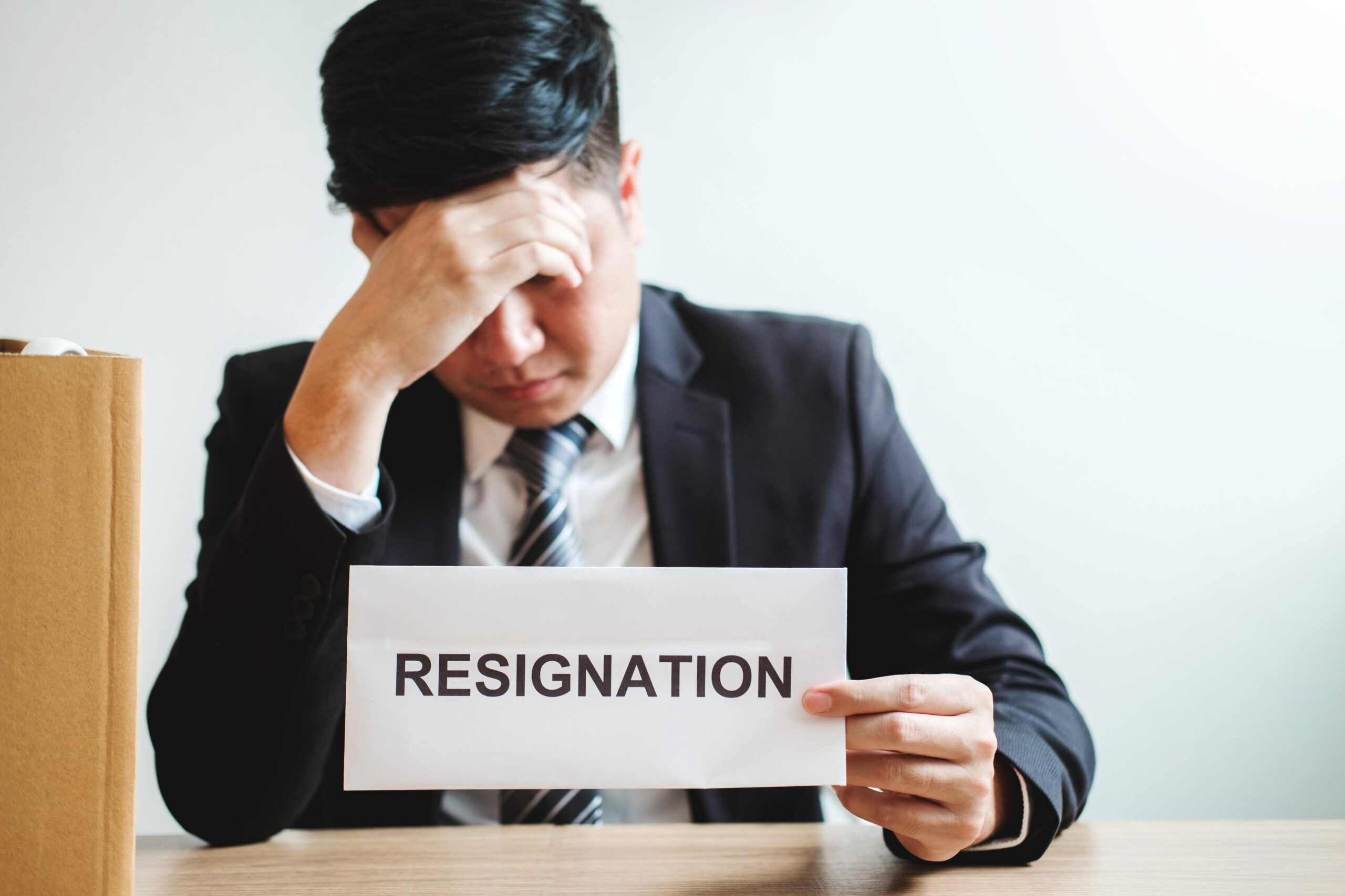
The reasons that so many business leaders are resigning and what can be done to stop the trend.
Over four million American workers have quit their jobs each month so far this year. And according to McKinsey and Company’s survey of 13,000 people across the globe (including 6,294 Americans), about 40% of workers are considering quitting their current jobs in the next three-to-six months. And 70% of the C-suite with the weight of the world—or at least the company—on their shoulders considers jumping ship in search of a role that supports their well-being.
Poor CEO Mental Health Skyrocketing
“But why are the seams bursting now? Why not two years ago?” asks Bryan Adams, CEO and founder of Ph.Creative. “In times of crisis, most CEOs summon all their energy to keep teams aligned and focused on a shared vision for the business,” he explained to me. The old work rules told us that to get ahead we must over-perform and out-shine the person next to us. Poor mental health in leadership has been normalized for too long, according to Adams, as CEOs are expected to put work challenges before their own self-care, and many leaders feel like they’re fighting an uphill battle that can only end in failure.
“In times of chaos, there’s an unofficial playbook for business that dictates what to prioritize, how to communicate, who to hire, who to cut, when to reassure and how to explain the situation to others,” Adams said. “Crisis situations create massive amounts of stress and high levels of pressure. These situations can also double an already exhausting workload by adding crisis management on top of the requirements of a daytime job. When you stretch those circumstances over a two-year period, many leaders find that navigating professional integrity, health and well-being becomes unsustainable and extremely dangerous. Prior to 2020, there was a playbook you could follow. Now, leaders are left scrambling, trying to put the pieces back together as more social and economic changes continue to transpire every day.”
Adams draws the analogy of playing a board game where the design of the board keeps changing every few minutes. Then, he says, imagine every other player in the game looking to you to explain the new board and help them navigate their way through, even though it’s clear that you can barely comprehend the changing landscape yourself. “To make things worse, there’s an old rule book that no longer matches the board,” he adds, “However, you’re expected to stick to those rules despite their restrictive and even contradictory appearance. With the new layout, these rules actually prevent you from doing right by yourself and the players around you.”
MORE FOR YOU
One CEO’s Mental Health Struggles
As leaders navigate the impact of retention issues, inflation, an economic recession and “quiet quitting,” work challenges are daunting. These factors lead to unmanageable levels of stress and anxiety. No wonder more than half of CEOs cite mental health struggles. Because of his own mental health challenges, Chris Federspiel, CEO and founder of Blackthorn.io, is passionate about bringing mental health awareness to the C-level. Chris believes many CEOs suffer from what he calls ego depletion—massively over-investing in the business at the expense of themselves. “When CEOs or founders get sick, exhausted or fatigued, overeat or depend on alcohol or cigarettes or other viruses, it often stems from the concept of ego depletion,” he said and shared with me the story of his own work issues:
“As a founder, I used to get sick for two weeks at a time because of the stress, dealing with symptoms resembling a cold that wouldn’t go away. I’d get better for another two weeks, and then the symptoms would return. But these issues didn’t just manifest physically. I’d get overwhelmed and take my frustrations out on my employees, causing tension and abrupt decision-making that was detrimental to company morale. Through therapy for my bipolar disorder and parental abuse, I learned that I suffered from ego depletion, which most often occurred from over committing in business and personal life, neglecting myself. Many CEOs and founders struggle with the same issue with effects ranging from sickness and exhaustion to overeating and alcohol or drug dependency. I’d over commit because I’d feel we weren’t doing enough, so I’d ask every person to take on more even with a full slate of work. I started solo projects working nights and weekends. I thought I could expand my capacity without limits, which resulted in products getting launched without enough testing, shallow work efforts (work passed to employees without enough context and half-baked instructions given to customers), and a high cash burn rate. This, in turn, increased my stress, causing me to get sick, anxious, angry and short-tempered.”
CEO’s Rewriting The Playbook For Trying Times
The old “work yourself to death” mentality at the expense of your mental health is changing. CEOs do their best work when they re-prioritize their mental and physical well-being, so they can avoid burnout and work with a sense of purpose. “The human inclination is to let fear—or whatever short-term pain the decision will inevitably bring—scare you out of moving forward,” Simon Berg, CEO at Ceros.com told me. “Regardless of who or what you’re leading, you’ll be constantly bombarded with challenges and choices that you’ll have to make,” he said. “You’ll question your ability to approach these challenges successfully and if you have the know-how to make executive decisions. When you drill down into it, what courage really is, is the ability to overcome fear, and having courage is a key element of the CEO who must push onward regardless.”
So, how can CEOs turn fear and doubt into courage and change the old playbook? Berg offers these three tips for CEOs and entrepreneurs:
- Acknowledge your fear. Fear is normal, not a singular experience.
- Externalize it. Share feelings of fear and doubt in a transparent way with trusted people.
- Keep moving. Find something small to focus on, instead of tackling the big things all at once.
In order to do this, Adams believes leaders must shift toward “mental fitness” from “mental health” and have more open conversations about wellness as they draft the new playbook. “Organizations as a whole should be actively changing the narrative to be inclusive and welcoming of wellness initiatives to help employees cope with stress and then eventually thrive,” he says.
Federspiel agrees, refusing to sacrifice self-care so as not to give up in the face of high stress. “Exercising regularly, eating healthy and getting enough sleep are critical,” he notes. “But equally important is setting boundaries such as scheduling Slacks and emails to send during working hours, taking a full week off of work and implementing our four-day work week.”
He insists these changes have created mental room for clearer thought, so he can focus on the company’s long-term vision in a way he couldn’t when always on high alert. “I’m a better CEO because I’m a healthier person, physically and mentally,” he said, adding, “I often tell our team, ‘We’re not resuscitating hearts by hand. We can take time off—very few things are an emergency.’ I don’t want to run our company like Elon Musk runs his. Our pace of innovation is not as rapid, conversely, but it helps to instead focus on managing ego depletion and increasing employee morale.”
Adams agrees that new requirements and new questions require new playbooks. “Organizations must also find new answers to old questions while building a coherent path towards normalcy,” he concluded. “As such, many leaders have found themselves stuck in an impossible situation. Leaders are beginning to write a new playbook for navigating trying times. From a survival mode perspective, the new playbook must focus on wellness, even considering it as a basic hygiene factor. Before, wellness was nice to have. Today it’s an essential coping tool to stay sane, fit and alive.”







